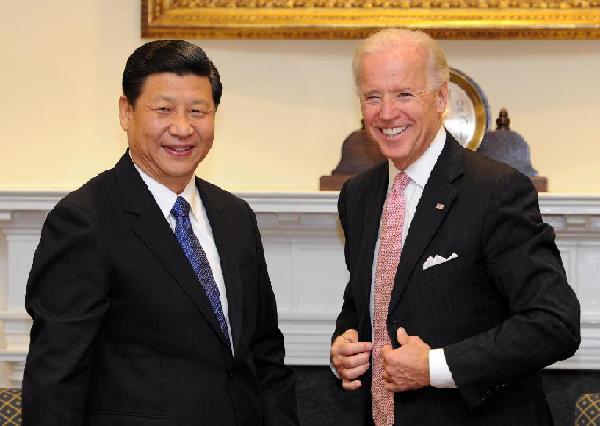Chinese vice-president's U.S. tour hailed as future-oriented landmark
- By Wu Liming, Qian Tong, Huo Xiaoguang
 0 Comment(s)
0 Comment(s) Print
Print E-mail Xinhua, February 19, 2012
E-mail Xinhua, February 19, 2012
|
Chinese Vice President Xi Jinping (L) holds talks with his U.S. counterpart Joe Biden at the White House in Washington, the United States, Feb. 14, 2012. [Xinhua/Xie Huanchi] |
"NEAR-SUMMIT" TREATMENT
Xi's official U.S. visit started on Feb. 13 as a guest of his U.S. counterpart Joe Biden. He was greeted by senior U.S. officials upon arrival, including Deputy Secretary of State William J. Burns and U.S. Ambassador to China Gary Locke.
Xi's visit came at a crucial time when China-U.S. relations are at a turning point.
Forty years ago, then U.S. President Richard Nixon paid his ground-breaking visit to China, which opened the door for the development of China-U.S. relations, and led to the official establishment of diplomatic relations between the two countries on Jan. 1, 1979.
The year 2012 is of vital significance to both China and the United States. The U.S. presidential election will be held in November while a Party congress will be held in China, which is set to realize a leadership transition.
In the meantime, the international situation is undergoing complex and profound changes, and cooperation and coordination between China and the United States have become all the more crucial and vital.
Xi's visit has attracted worldwide attention, with local and international press eager to cover the event long before his arrival.
The Washington Post ran a story on Xi's tour on its front page Monday titled "A Key Visit for China, U.S.," while the CNN aired Xi's arrival in its primetime session and presented an in-depth analysis of the visit.
"This visit is an investment in the future of the Chinese-American relationship," Tony Blinken, Biden's national security adviser, was quoted as saying by local press.
For days, U.S. media have repeatedly said that Xi was enjoying a "near-summit treatment" during his visit. To a certain extent, it is true.
On Feb. 14, the second day of Xi's stay in the U.S., the federal administration organs in Washington seemed to have entered a "China Day."
First of all, President Obama received Xi at the Oval office of the White House, discussing candidly over a number of issues of common concern. Local television channels, including the CNN, broadcasted live the opening session of the meeting.
Xi was also invited by Biden to talk at the renowned Theodore Roosevelt room in the west wing of the White House, and was accompanied by his U.S. counterpart at as many as 11 out of his 30 events during the tour. Biden flew to Los Angeles to host a farewell banquet in Xi's honor.
At the Pentagon, U.S. Secretary of Defense Leon Edward Panetta hosted a welcoming ceremony in front of the Pentagon in honor of Xi. Martin Dempsey, chairman of the Joint Chiefs of Staff, also attended their meeting.
Just like the local media put it, it is "rare" for the host to stage the above-mentioned diplomatic arrangements for Xi.






